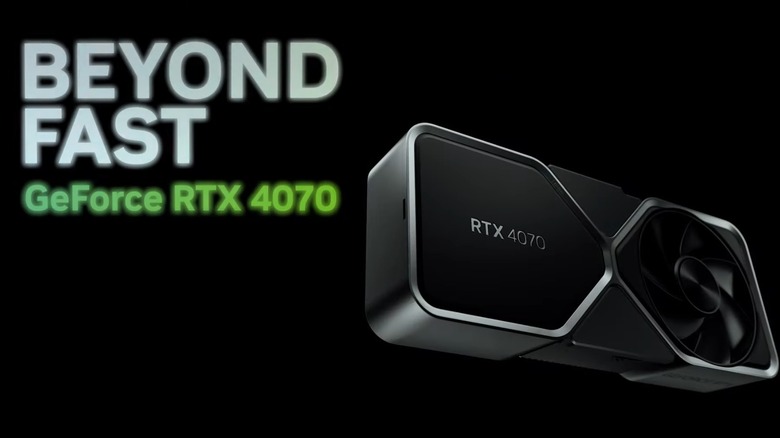Nvidia Reveals RTX 4070 As A $599 1440p Workhorse
When it comes to graphics cards, it's no secret that Nvidia dominates the market, and we've seen this trend repeated most recently with the performance of the GeForce RTX 40-series. On April 12, 2023, Nvidia announced and released the GeForce RTX 4070, the brother of the RTX 4070 Ti that was released earlier this year.
The RTX 4070 brings a number of improvements over the previous year's RTX 3070, all of which Nvidia claims will boost performance in both traditional rasterization and ray tracing workloads. It's unwise to compare specifications across GPU generations and architectures, but the RTX 4070 receives a significant jump in boost clock speed, up to 2.48 GHz from the RTX 3070's 1.73 GHz . This time around, VRAM is also up from 8 GB to 12 GB, with an upgrade to GDDR6X, matching that of the RTX 4070 Ti in every regard.
Compared to the RTX 4070 Ti, the RTX 4070 runs at a higher clock speed, but features fewer CUDA cores, with only 5888 — down from 7680 CUDA cores in the 4070 Ti.
The RTX 4070 and 4070 Ti are both more efficient and more powerful
Nvidia bills the RTX 4070 as a 1440p mid-range card, despite the somewhat high MSRP of $599. According to reviews from the likes of Hardware Unboxed and Linus Tech Tips on YouTube, Nvidia's hardware improvements have paid off. It depends on what game you're running, but at 1440p, the RTX 4070 seems to be about 24% faster than the previous year's RTX 3070 Ti, and about 5% faster than even the RTX 3080. The 4070 Ti outpaces the 4070, with results showing around an 18% performance improvement over the standard RTX 4070.
On the redder side of the GPU market, AMD's Radeon RX 6800 XT is the closest competition to the RTX 4070, both in terms of performance and price. The difference here comes in features: AMD's ray tracing and AI features are typically far less impressive than the combination of Nvidia's Ray Tracing, Tensor cores, and features like DLSS 3. The RTX 4070 also gets an upgrade to both the Nvidia's Tensor cores and Ray Tracing Cores, bringing Tensor cores up to the fourth generation, while RT cores are now in the third generation.
All of Nvidia's improvements reflect in the power draw and thermal output of the RTX 4070, as well, with the GPU having a maximum TDP of 200 watts — almost 10% lower than the RTX 3070. The RTX 4070 should hit store shelves on April 13, 2023.
